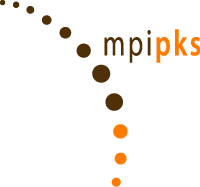
Disorder, Interactions and Coherence: Warps and Delights
Workshop Report
Focus Workshop DIC 16
Disorder, Interactions and Coherence: Warps and Delights
Scientific coordinators: Serguei Brazovskii and Natasha Kirova (Orsay, France),
and Leonid Levitov (MIT, USA)
Financial support from other sources than MPIPKS: Cavendish laboratory and Trinity College of the Cambridge University covered travel, local expenses and conference fees for three their participants.
Structure of the event: Talks (25 minutes) on advanced topics, while keeping the pedagogical aim with respect to the young audience. Poster session.
Participant's details
Total number of participants: 60.
Among them: Professors - 35, PhD - 21, PhD students - 4.
Geography: USA -16, France - 9, Germany - 8, UK - 6, Israel - 4, Russia - 4, Italy - 2, The Netherlands - 4, Switzerland - 2, Australia - 1, Belgium- 1, India - 1, South Korea -1, Slovenia-1.
The Workshop was centered around major modern directions in physics of disordered systems such as Many-Body Localization, Decoherence and Noise, Multifractality and Integrability, Disorder versus Superconductivity and Interactions or Nonlinearity. There were also more auxiliary modern subjects such as quantum Hall effect (QHE, integer and fractional), topological states and phase transitions, Majorana and Weyl fermions, chiral anomaly, quantum critical points, hydrodynamics of electrons, high-Tc superconductivity, etc. Most of talks at the workshop were based upon very recent results and even unpublished yet papers.
The workshop has been initiated in honor 50 years in science of David Khmelitskii, now the emeritus professor at Cambridge UK and formerly at the Landau Institute in Russia. His alumnae from these fabulous institutes and his very successful former students strongly contributed to the accomplishment of the workshop.
At the core of the meeting, several talks have been presented by senior scientists from leading laboratories over the world, who have contributed substantially to the proposed research field. Among them are J. Chalker, M. Dyakonov, K. Efetov, M.V. Feigelman, A. Finkelstein, P. Fulde, L. Glazman, L. Ioffe, P. Littlewood, Yu.N. Ovchinnikov, V.L. Pokrovskii, A.M.M. Pruisken, G. Schön, B. Spivak, P. Wiegmann, and others.
The sessions were followed by vital discussions during the breaks and, especially, during the poster session which was remarkably well attended by all participants. Beyond the mature scientists, there was a large contingent of young people in their 20th and early 30th. Most of young people contributed significantly to success of the workshop by both presenting their original research and participating in discussions.
The Workshop went on very friendly: hot scientific discussions facilitated learning and understanding. At the end, many participants expressed their satisfaction by the atmosphere and exceptionally high scientific level of the Workshop.
